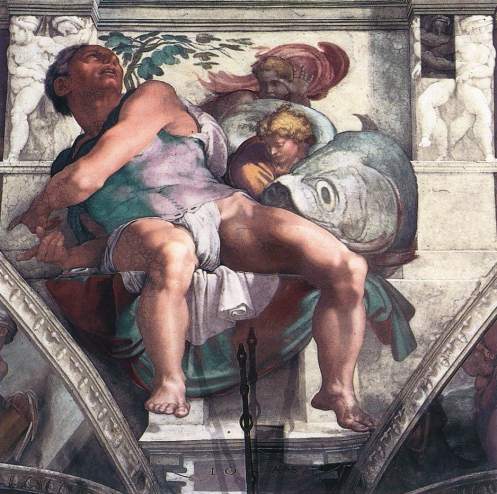When I was recently interviewed by Katy Giebenhain of the Seminary Ridge Review (published by Gettysburg Lutheran Theological Seminary), she asked me to compile a list of works that might interest her readers. It was an interesting exercise since it got me looking at works through the vantage point of those responsible for the spiritual well-being of communities.
I’ll post the list for you some time soon, but for the moment I’ll share the first poem that came to mind. It’s a George Herbert lament (“George Herbert again?!” I hear you say) about the pressures he feels God is putting on him. Having once believed himself called to serve God, Herbert in “The Collar” now feels God’s call to be an intolerable burden.
“Collar” works as a triple pun—a clerical collar, a prisoner’s collar, and “choler.” Why, for all that I have done, am I only harvesting a thorn, the poet cries as he pounds the table. Why am I still standing in suit to God when I could simply turn my back on it all? After all, “My lines and life are free, free as the road, loose as the wind, as large as store.”
Here’s the poem (with my regular apologies for all the lines justifying to the left, thereby destroying Herbert’s spacing):
The Collar
George Herbert
I struck the board, and cried, No more;
I will abroad.
What? shall I ever sigh and pine ?
My lines and life are free; free as the road,
Loose as the wind, as large as store.
Shall I be still in suit?
Have I no harvest but a thorn
To let me blood, and not restore
What I have lost with cordial fruit?
Sure there was wine,
Before my sighs did dry it: there was corn
Before my tears did drown it.
Is the year only lost to me?
Have I no bays to crown it?
No flowers, no garlands gay? all blasted?
All wasted?
Not so, my heart: but there is fruit,
And thou hast hands.
Recover all thy sigh-blown age
On double pleasures: leave thy cold dispute
Of what is fit, and not forsake thy cage,
Thy rope of sands,
Which petty thoughts have made, and made to thee
Good cable, to enforce and draw,
And be thy law,
While thou didst wink and wouldst not see.
Away; take heed :
I will abroad.
Call in thy death’s head there: tie up thy fears.
He that forbears
To suit and serve his need,
Deserves his load.
But as I raved and grew more fierce and wild,
At every word,
Methought I heard one calling, Child:
And I replied, My Lord.
The references to the wine and corn (wheat) are to the Eucharist, which once sustained Herbert but now appear ineffective. As a result, he contemplates a different life. If God can merely wink and refuse to see Herbert’s miseries, then Herbert in return will resort to “double pleasures.“ As I read he poem, he resolves to stop doing “what is fit” and will remain happily in the shallow cage or rope of sands that make up self indulgence. Take heed, God. He says. This will be my new law. I’m prepared to go abroad, and anyone that remains in suit to God is a sucker who deserves his load.
And then we have the remarkable final quatrain. To this point, the poem has been an escalating temper tantrum. But God, who sees into our hearts, calls out “Child.” To draw on the Jennifer Michael’s idea about which I posted last Sunday, Herbert has to exhaust himself from his anger before he can hear God’s voice. At that point, Herbert realizes that God loves him in spite of his own self doubts and he responds as a child to a loving parent.
And I replied, “My Lord.”
Added Note:
I have chosen an image of Jonah as someone who fled abroad rather than respond to God’s call. I read Jonah’s being swallowed by a fish as a metaphorical expression the depression one experiences when one cuts oneself off from God. Here’s from Jonah 2: 3-6 (New International Version):
3 You hurled me into the depths,
into the very heart of the seas,
and the currents swirled about me;
all your waves and breakers
swept over me.
4 I said, ‘I have been banished
from your sight;
yet I will look again
toward your holy temple.’
5 The engulfing waters threatened me,
the deep surrounded me;
seaweed was wrapped around my head.
6 To the roots of the mountains I sank down;
the earth beneath barred me in forever.
But you, LORD my God,
brought my life up from the pit.
I think Herbert is also seeing himself as the crucified Christ here (or imagining Christ complaining as he himself is complaining). Christ gave himself to God and experienced in return the crucifixion, a crown of thorns rather than the victor’s crown of bay leaves. There’s a medical image: blooding (say with a thorn) is supposed to restore, just as the Resurrection restores, but at the moment Herbert doesn’t see new life. All appears wasted.



One Trackback
[…] himself to God. In some of these he lashes out in angry frustration. (For instance, see my posts on “The Collar” and “Longing.”) And while there are side references to those dark moments in this […]